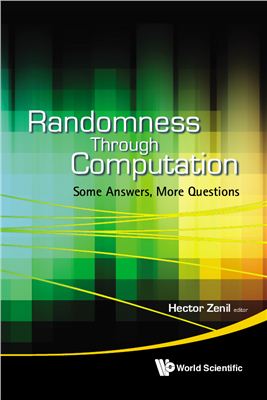World Scientific Publishing Company, 2011. - 440 pages.
This review volume consists of a set of chapters written by leading scholars, most of them founders of their fields. The volume is intended to explain the phenomenon of Randomness through the use of Computation, and to explore the connections of Randomness to other areas of scientific knowledge, especially its fruitful relationship to Computability and Complexity Theory, and also to areas such as Probability, Statistics, Information Theory, Biology, Physics, Quantum Mechanics, Leaing Theory and Artificial Intelligence. The contributors cover these topics without neglecting important philosophical dimensions, sometimes going beyond the purely technical to formulate age old questions relating to matters such as determinism and free will. The scope of Randomness Through Computation is novel. Each contributor shares their personal views and anecdotes on the various reasons and motivations which led them to the study of Randomness. Using a question and answer format, they share their visions from their several distinctive vantage points.
The following are the sections in which the contributions have been grouped: Stochastic Randomness and Probabilistic Deliberations | Randomness and Computation in Connection to the Physical World | Algorithmic Inference and Artificial Intelligence | Computational Complexity, Randomized Algorithms and Applications.
This review volume consists of a set of chapters written by leading scholars, most of them founders of their fields. The volume is intended to explain the phenomenon of Randomness through the use of Computation, and to explore the connections of Randomness to other areas of scientific knowledge, especially its fruitful relationship to Computability and Complexity Theory, and also to areas such as Probability, Statistics, Information Theory, Biology, Physics, Quantum Mechanics, Leaing Theory and Artificial Intelligence. The contributors cover these topics without neglecting important philosophical dimensions, sometimes going beyond the purely technical to formulate age old questions relating to matters such as determinism and free will. The scope of Randomness Through Computation is novel. Each contributor shares their personal views and anecdotes on the various reasons and motivations which led them to the study of Randomness. Using a question and answer format, they share their visions from their several distinctive vantage points.
The following are the sections in which the contributions have been grouped: Stochastic Randomness and Probabilistic Deliberations | Randomness and Computation in Connection to the Physical World | Algorithmic Inference and Artificial Intelligence | Computational Complexity, Randomized Algorithms and Applications.

